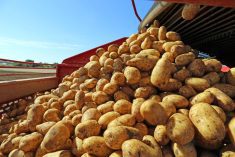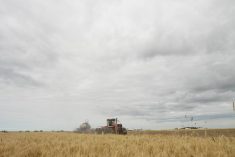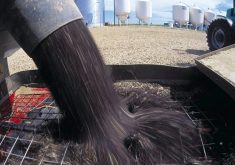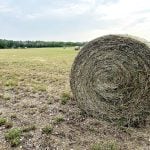Exports of Prince Edward Island table stock potatoes are again officially allowed to enter the mainland United States, after new U.S. entry rules regarding potato wart were published Friday.
Canada’s federal Agriculture Minister Marie-Claude Bibeau said on Twitter that officials with the Canadian Food Inspection Agency (CFIA) are now preparing to certify exports of eligible P.E.I. potatoes to the U.S. “as quickly as possible” to meet the new rules.
Export certificates can now be requested for shipments that meet the new order from the U.S. Department of Agriculture’s Animal and Plant Health Inspection Service (APHIS), CFIA said Friday in a separate notice.
Read Also

Alberta harvest wrapping up: report
Harvest operations advanced to 96 per cent complete in Alberta as of Oct. 7, with only a few late-seeded cereal and canola fields remaining, according to the latest provincial crop report.
Friday’s order from APHIS ends an export ban in place since Nov. 22. That’s when APHIS advised U.S. border officials to reject shipments of P.E.I. potatoes — thus leaving CFIA unable to certify outgoing shipments, which in turn led to a Canadian ministerial order to suspend export permits.
The suspension had followed confirmations of the fungus that causes potato wart in two P.E.I. fields last October. Another “directly associated” field was confirmed with the fungus last month.
Potato wart is not brand-new to P.E.I., although it remains relatively rare there. The province has confirmed 34 fields with the potato wart pathogen since its first case was discovered, in 2000.
Canadian and U.S. officials, after a months-long ban in 2000, agreed on a new system allowing exports from lower-risk zones of P.E.I. where the fungus hasn’t been detected — and the two countries operated under that system up until the cases in October.
APHIS said Friday its “subsequent confirmatory analysis” of P.E.I.’s potato wart situation in February led to the new order.
While the new order allows imports of P.E.I. potatoes for consumption, it still specifically prohibits imports of the province’s field-grown seed potatoes into the United States. The order allows entry of “in vitro plantlets, micro-tubers and mini-tubers for planting” but those will require a permit.
Under the new order, shipments of P.E.I. table potatoes eligible for export must be:
- from fields that don’t have potato wart or are “associated with known infestations;”
- grown from seed potatoes that were not produced on any wart-infected or wart-associated field;
- washed in P.E.I. to remove soil, and confirmed as free of soil on inspection at the port of entry;
- treated with a sprout inhibitor registered with Canada’s Pest Management Regulatory Agency (PMRA), and accompanied by a statement on the export documentation detailing that treatment;
- graded to meet the U.S. No. 1 standard (equivalent to Canada No. 1);
- officially “inspected for pest freedom” prior to export, after the potatoes are washed; and
- traceable from the field of production through to packing and export, allowing for full traceback and recall if need be.
Consignments arriving at a U.S. port of entry are also subject to inspection and must also come with a CFIA-issued, APHIS-approved certification that the potatoes are “free of quarantine pests for the United States” and declaring they meet all the requirements of the new order.
The new APHIS order replaces previous orders on P.E.I. potato imports for all U.S. states and territories — including for Puerto Rico, where APHIS had already allowed fresh P.E.I. potato exports to resume in February.
The P.E.I. Potato Board, in a separate statement Friday, said it’s “pleased to receive the confirmation” of APHIS’ new order, adding that farmers and potato packers will work with CFIA to “ensure the requirements are clearly understood.”
Potato growers and packers “look forward to moving ahead with shipping P.E.I.’s safe, healthy and world-class potatoes the remainder of the shipping season,” the board said.
That said, the board noted P.E.I. seed potato growers “are still subject to trade restrictions that need urgent attention, particularly with respect to adequate compensation.”
The federal government in December pledged up to $28 million to help P.E.I. growers manage the surplus of potatoes resulting from the U.S. export suspension. A resulting program, which also included $12.2 million in provincial funding, was formally launched in February with the goal of “diverting as many potatoes as possible to processors, packers and food banks.”
Where needed, the program also pledged to help P.E.I. growers cover the cost of “environmentally-sound destruction of surplus potatoes” at a rate of up to 8.5 cents per pound.
The U.S. in 2020 was by far P.E.I.’s biggest customer for potatoes, taking $476.9 million in fresh or chilled and processed potato goods, or just over 92 per cent of the province’s total potato exports, the province said last fall. Those product categories alone formed almost 84 per cent of the province’s total agricultural and agri-food exports last year.
While not considered a human health or food safety risk, potato wart is known to drag down crop yields and can make potatoes unmarketable by ruining their appearance.
The fungal disease appears mainly below-ground, on plants’ tubers and runners. It spreads through movement of affected potatoes, soil, farm equipment and manure from animals that digest infested potatoes.
Among Canadian provinces other than P.E.I., potato wart is present only in Newfoundland and Labrador. Potatoes, root vegetables, soil, used bags, burlap, plants with roots and soil and other containers with soil are not allowed to leave that province, except under CFIA permit. — Glacier FarmMedia Network

















